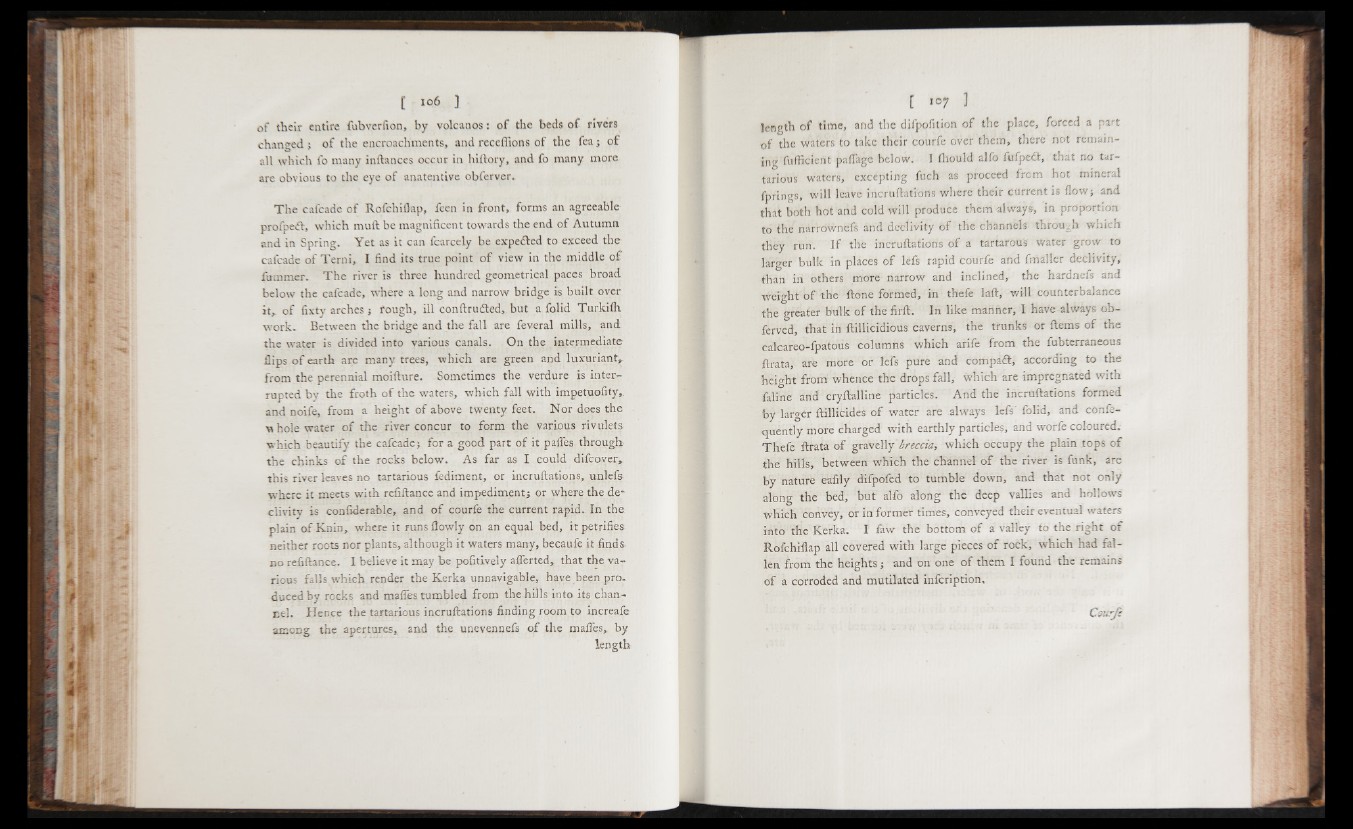
o f their entire fubverfion, by volcanos: o f the beds o f rivers
changed; o f the encroachments, and receifions o f the fea; o f
all which fo many inftances occur in hiftory, and fo many more
are obvious to the eye o f anatentive obferver.
T h e cafcade o f Rofcliiftap, feen in front, forms an agreeable
profpedt, which muft be magnificent towards the end o f Autumn,
and in Spring. Y e t as it can fcarcely be expefted to exceed the
cafcade o f Terni, I find its true point o f view in the middle o f
fummer. T he river is three hundred geometrical paces broad
below the cafcade, where a long and narrow bridge is built over
it , o f fixty arches; fough, ill conftrudted, but a folid Turkiih
work. Between the bridge and the fall are feveral mills, and
the water is divided into various canals. On the intermediate
flips o f earth are many trees, which are green and luxuriant,
from the perennial moifture. Sometimes the verdure is interrupted
by the froth o f the waters, which fall with impetuofity,.
and noife, from a height o f above twenty feet. Nor does the
w hole water o f the river concur to form the various rivulets
which beautify the cafcade; for a good part o f it paffes through-
the chinks o f the rocks below. As far as I could difcover,
this river leaves no tartarious fediment, or incruftations, unlefs
where it meets with refinance and impediment; or where the declivity
is confiderable, and o f courfe the current rapid. In the
plain o f Knin, where it runsllowly on an equal bed, it petrifies
neither roots nor plants, although it waters many, becaufe it finds
no refiftance. I believe it may be pofitively aliened, that the various
falls which render the Kerka unnavigable, have been produced
by rocks and maffes tumbled from the hills into its channel.
Hence the tartarious incruftations finding room to increafe
among the apertures, and the unevennefs o f the maffes,, by
length
length o f time, and the difpofition o f the place, forced a part
of the waters to take their courfe over them, there not remaining
fufficient paffage below. I ihould alfo iuipedt, that no tartarious
waters, excepting fuch as proceed from hot mineral
fprings, will leave incruftations where their current is flow; and
that both hot and cold will produce them always, in proportion
to the narrownefs and declivity of the channels through which
they run. I f the incruftations o f a tartarous Water grow to
larger bulk in places o f lefs rapid courie and fmaller declivity,
than in others more narrow and inclined, the hardnefs and
weight o f the ftone formed, in thefe laft, will counterbalance
the greater bulk o f the firft. In like manner, I have always ob-
ferved, that in ftillicidious caverns, the trunks or items o f the
calcareo-fpatous columns which ariie from the fubterraneous
ftrata; arfe more or lefs pure and compaft, according to the
height from whence the drops fall, which are impregnated with
faiine and cryftalline particles. And the incruftations formed
by larger ftillicides o f water are always lefs folid, and confe-
quently more charged with earthly particles, and worfe coloured.
Thefe ftrata o f gravellybreccia, which occupy the plain tops o f
the hills, between which the channel o f the river is funk, are
by nature eafily difpofed to tumble down, and that not only
along the bed, but alfo along the deep vallies and hollows
which convey, or in former times, conveyed their eventual waters
into the Kerka. I faw the bottom o f a valley to the right o f
Rofchiflap all covered with large pieces o f rock, which had fallen
from the heights; and on one o f them I found the remains
o f a corroded and mutilated infcription.
d u r j*